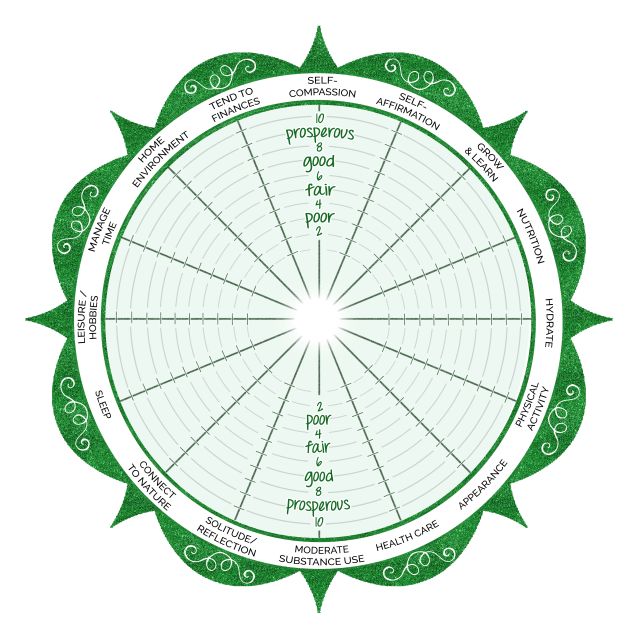Stress
A Tool to Assess and Improve Your Self-Care Practices
Reduce stress and foster resilience through routine self-care.
Posted March 5, 2023 Reviewed by Hara Estroff Marano
Key points
- According to a recent national survey, 75% of Americans believe self-care activities provide stress relief.
- Make a self-care plan unique to you as you identify the areas of your life that need improvement.
Incorporating self-care into your life doesn't have to be hard. While it may seem difficult when you are feeling overwhelmed, the rewards far outweigh the disadvantages.
In a recent survey1, Americans cited self-care benefits as enhanced self-confidence (64%), increased productivity (67%), and happiness (71%). Self-care also reduces heart disease, stroke, and cancer. A study2 shows that self-care not only brings improved well-being, it also reduces morbidity, mortality, and healthcare costs. To see how you rate your self-care, you need to first look at your self-love practices.
Measure How Well You Are Doing at Self-Care with the Self-Love Wheel Exercise

This is a self-evaluation tool that allows you to see your strengths and weaknesses when it comes to self-care practices. Feel free to print out the wheel exercise and share it with others who you think might benefit from it—friends, family, clients. I developed the Self-Love Wheel Exercise as a tool to help people measure how well they are doing in 16 ways of creating self-care.
Self-Compassion: Self-compassion allows you to silence your inner critic, practice self-forgiveness and self-acceptance, and be your most compassionate advocate. It is the opposite of self-flagellation or excessive guilt and regret; it creates a mental state in which you can recognize mistakes, learn from them, and get back on track.
Self-Affirmation: Honor your strengths, gifts, and unique abilities and see all that is beautiful and good about you. Positive self-talk starts with self-care affirmations such as:
“I am worth creating time and space for self-care.”
“My loved ones depend on me taking excellent care of myself.”
“I can not give from an empty cup.”
“I care for myself as my own loving parent.”
Growth and Learning: Invest in activities, classes, and independent learning to help you grow and develop.
Nutrition: Healthy eating includes limiting sugar and processed foods, cooking at home, eating balanced meals, and portion control.
Hydration: To avoid dehydration, skip the soda and energy drinks and instead drink water. Good hydration habits can improve your mood, sleep, and overall health and wellness. The National Academies of Sciences, Engineering, and Medicine3 suggest women drink about 88 ounces of fluids daily and men drink 128 ounces.
Physical Activity: Physical activity is anything that gets your body moving. According to the Physical Activity Guidelines for Americans4, adults need 150 minutes of moderate-intensity physical activity and two days of muscle-strengthening activity per week. Physical activity and exercise can be effective treatment strategies for symptoms of both depression and anxiety.
Appearance: Groom yourself with love and care and put yourself together so that you feel like the beautiful person that you are.
Health Care: Prioritize your own health care by considering annual physicals, dental care, mental health counseling, and specialty care or holistic care as needed.
Moderate Substance Use: Moderate the use of caffeine, alcohol, sleep aids, or other substances in your life. Moderation is key. If you are concerned about addiction, consult with a therapist or self-help group.
Solitude/Reflection: Prioritize time for solitude and reflection by welcoming stillness and quiet time into your life.
Connect to Nature: Embrace the outdoors, animals, or plants. Studies5 have found that exposure to natural environments improves working memory, cognitive flexibility, and attentional control, while urban environments are linked to attention deficits.
Sleep: Make sure you get enough sleep and have the ability to fall asleep easily and stay asleep. National Sleep Foundation guidelines6 advise that healthy adults need between 7 and 9 hours of sleep per night.
Leisure/Hobbies: Enjoy the benefits of relaxing and activities such as art, music, or sports.
Time Management: Time management is about setting healthy time boundaries between work and personal life. Make sure to unplug from technology—turn off your phone before bedtime and during mealtimes, do not respond to work emails after work hours or when on vacation, and limit screen time. Aim to strike a balance between connecting with others and allowing time for solitude.
Home Environment: Establish a pleasant sanctuary for yourself by keeping your home clean, organized, and functional.
Tend to Finances: Aim to have a healthy balance of saving and spending and treat yourself within your means. Ask yourself, “Am I financially fit?” Your bank balance is only part of the answer to this question. Money brings up deep issues around self-worth, self-image, justice, and survival-level fear. Stress can also negatively impact finances. Becoming truly financially fit encompasses all those aspects of ourselves.
Create an Action Plan to Improve Your Self-Care
Identify at least three areas you think you could improve upon. How do you think dedicating some energy towards that might increase the amount of self-care you give yourself?
Develop an action plan with goals that are SMART (specific, measurable, achievable, realistic, and timely) to do better in these areas. Share them with an accountability partner such as your therapist or coach and set up a date for follow-up in two to four weeks. Discussing the results of your self-care wheel in therapy will often lead to new insights and connections that will help you improve your relationship with yourself.
As you improve your self-care practices, you will likely see improvements in your mental and physical health, job performance, relationships, and overall well being.
Consider completing the Self-Care Wheel Exercise monthly or quarterly as you work on incorporating more self-care into your life. You are worth it.
References




